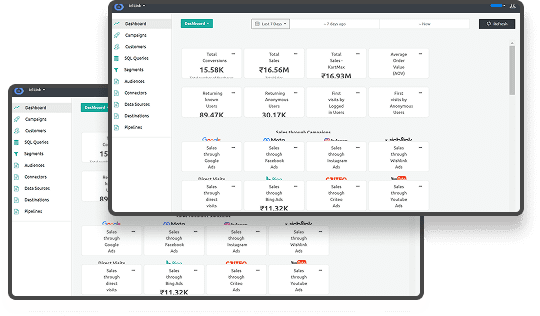It looks like cookies aren’t the only things that crumble—your advertising strategy might, too, in a cookieless world!
Introduction to the Cookieless World
The digital advertising world is undergoing a significant shift. As privacy concerns grow and regulations tighten, the industry moves toward a cookieless future. This transition will affect how businesses collect and use data, making it crucial to adapt your marketing strategies. This transition isn't just a trend—it's a necessary evolution in digital advertising. With major players like Google, Mozilla, Apple, and Microsoft leading the charge, the days of third-party cookies are numbered.
These companies are driving the change to protect user privacy and provide a more secure browsing experience. Google's Chrome browser holds a dominant position with around 65%-70% of the global market share. This decides to phase out third-party cookies by the second half of 2024—a critical turning point. Mozilla's Firefox, Apple's Safari, and Microsoft have blocked third-party cookies by default, setting the stage for a cookieless future.
As third-party cookies fade away, advertisers and marketers must rethink their strategies. This article will help us learn more about cookies.
Exploring Cookies
In the digital world, cookies are more than just treats. They play a crucial role in how websites function and how marketers understand their audiences. But as privacy becomes a top priority, it's essential to understand what cookies are and how they work.
Definition of cookies:
Cookies are small text files stored on your device when you visit a website. They help websites remember your actions and preferences, like login details or language settings, so you don’t have to re-enter them every time you visit. While they enhance user experience, they also raise questions about privacy. Let’s now look at their types:
- First-Party Cookies:
First-party cookies are set by the website you’re currently visiting. These cookies are essential for providing a seamless user experience. They help you remember your login credentials, keep items in your shopping cart, and store other preferences. They are generally seen as less intrusive because they are directly set by the site you're engaging with. Check this out to learn more about Ingest Labs' usage of first-party cookies through Ingest ID.
- Third-Party Cookies:
Third-party cookies, however, are set by domains other than the one you’re visiting. They are typically used to track your online behavior across multiple sites to serve targeted ads. While effective for marketers, these cookies have become the center of privacy concerns, leading to the push towards a cookieless future.
But before we dive in, let's get the scoop on why we're making this significant shift.
Reasons for the Transition to a Cookieless World
Let’s look at the reasons for the transition in detail:
- Privacy and Data Protection Concerns:
Scandals like the Facebook-Cambridge Analytica incident have made people wary of how their data is tracked and utilized. As a result, there’s a stronger push for regulations that protect user privacy, driving the shift towards a cookieless environment.
- Incidents Highlighting the Need for Change:
Several high-profile incidents, such as Google’s controversy over its use of DoubleClick cookies circumventing Safari's default privacy settings, have brought the issue of tracking to the forefront. These incidents have fueled the demand for stricter data protection measures and increased transparency, making it clear that the old ways of tracking users are no longer acceptable.
- Browser Responses:
In response to these concerns, browsers like Safari and Firefox have blocked third-party cookies by default. With its significant global browser share, Google is no more blatantly killing cookies, but is doing so with consent from users. These changes from major players are forcing the entire digital marketing industry to adapt and find new ways to reach and understand audiences without relying on third-party cookies.
Let's see how this cookieless world is shaking things up in digital advertising.
Impact on Digital Advertising
This change isn't just a technical adjustment—it's a fundamental shift in digital marketing.
- Programmatic Advertising Reliance on Cookies:
Programmatic advertising has long relied on cookies to deliver targeted ads. Without third-party cookies, this approach faces significant challenges. Advertisers will find tracking users across multiple websites more challenging, making it harder to serve personalized ads. This disruption forces a reevaluation of how to effectively reach the right audience at the right time. Ingest Labs can help you combat this change with our third-party cookie-free tools, which are privacy-friendly, thereby helping you prepare for this new reality.
- Revenue Drop Due to the Transition:
Many businesses are concerned about potential revenue drops and reduced ad performance. Without the detailed tracking that cookies provide, measuring the effectiveness of campaigns becomes more difficult.
- Shifts in Marketing Strategies to Adapt:
Marketers increasingly use first-party data, contextual targeting, and other privacy-friendly methods to reach their audiences. These shifts require a deeper focus on building direct customer relationships and finding innovative ways to deliver value without relying on invasive tracking.
Now, let's shift gears and explore some game-changing alternatives that can keep your ads thriving.
Alternative Advertising Solutions in a Cookieless World
The cookie-free world doesn't spell the end for effective advertising—far from it. Instead, it opens the door to innovative, privacy-focused strategies that can keep your campaigns thriving.
- First-Party Data Collection and Utilization
In a cookieless world, first-party data becomes your most valuable asset. Collecting data directly from your audience through interactions on your website, app, or email campaigns allows you to maintain a direct connection with your customers. This data is more accurate and respects user privacy, making it a cornerstone of future marketing strategies. You can read more about Ingest Labs’ server-side tagging, which endorses a first-party data strategy.
- Contextual Targeting Based on Content Sources
Contextual targeting is making a comeback as a powerful alternative to cookie-based tracking. Instead of relying on user behavior across the web, this method focuses on the context in which ads appear. By analyzing the content of a webpage, you can place relevant ads that resonate with the audience, ensuring that your message aligns with what they are already interested in.
- Privacy-Friendly Advertising Solutions
As privacy concerns grow, so does the need for advertising solutions prioritizing user trust. Tools like Apple's SKAdNetwork and Google’s Privacy Sandbox are leading the charge by offering ways to measure campaign performance without compromising user privacy. These solutions allow you to continue delivering effective ads while complying with new privacy regulations.
Adapting to these alternative solutions helps you stay ahead in a cookieless world and builds a more robust future with your audience.
Future of Advertising in a Cookieless World
As the industry moves away from traditional cookies, the future of advertising will be defined by how well businesses adapt to new strategies.
- Enhancing First-Party Databases:
Building and maintaining a robust customer information database gathered directly from your website, apps, and interactions will become essential. This data is more reliable and gives you greater control over your marketing strategies, helping you deliver more personalized and relevant content to your audience.
- Consensual Information Gathering:
Consensual information gathering—where customers willingly share their data in exchange for value—will be essential. By being transparent about collecting, storing, and using data, you can build trust and ensure compliance with privacy regulations. This approach respects user privacy and strengthens your relationship with your audience. Ingest Labs ensures that businesses using its analytics platform communicate clearly about the data they collect through its compliance with GDPR.
- Direct Programmatic Deals Over Auctions:
The shift away from cookies will also impact how programmatic advertising operates. More businesses will turn to direct programmatic deals instead of relying on auction-based models that depend on third-party data. These deals involve negotiating directly with publishers to secure ad placements, ensuring better targeting and relevance without the need for cookies.
- Adoption of Omnichannel Approaches:
By integrating data and insights across all touchpoints—online and offline—you can create a seamless customer experience. This approach allows you to understand your audience’s behavior across different platforms and tailor your marketing efforts accordingly, ensuring consistent messaging and a unified brand presence.
Ready to roll up your sleeves? Here’s how to get started with your preparations.
Preparing for the Transition
The shift is inevitable; the sooner you adapt, the better positioned you'll be to maintain your competitive edge. Here's how you can get started:
- Building Cookie-Compliant Websites:
Your first step in preparing for the transition is to ensure your website is cookie-compliant. This means reviewing and updating your cookie practices to align with new privacy standards. Implement a consent management platform (CMP) to give users control over their data and ensure they can easily opt in or out of cookie tracking. This will help you stay compliant and build trust with your audience.
- Leveraging Tools for Informed Consent Collection and Management:
Collecting and managing user consent is more important than ever. Utilize advanced tools that make it easy for users to understand what they’re consenting to. These tools should offer clear, concise explanations of how their data will be used and provide options to manage their preferences. By prioritizing transparency, you can enhance your customer relationship and reduce non-compliance risk.
- Collaboration with AdTech Companies for Ethical Data Utilization:
Partnering with AdTech companies prioritizing ethical data utilization will be key to your success in a cookieless world. These collaborations will enable you to tap into innovative solutions that respect user privacy while delivering effective advertising. By working with the right partners, you can continue to achieve your marketing goals without relying on outdated cookie-based methods. Ingest Labs can provide the perfect way to ethically collect data along the customer's journey through Ingest ID.
So, what’s the bottom line here? Let's wrap it up.
Conclusion
The transition to a cookieless world marks a significant change in digital advertising. Traditional methods reliant on third-party cookies are becoming obsolete, pushing businesses to explore new avenues for targeting and measuring success. Adapting to this new reality is not just a choice but a necessity. Investing in tools and technologies that support cookie-free operations is crucial, ensuring your marketing efforts remain compliant and you remain proactive. Keep your focus on building trust with your audience through transparent and ethical data practices, and you'll continue to see positive results.
If you're looking to elevate your marketing strategy, consider so with Ingest Labs. This approach allows you to fine-tune your campaigns and boost your ROI. Schedule a demo with Ingest Labs today for tailored guidance and assistance in making a smooth transition. Let us help you maximize the potential of our tool.






